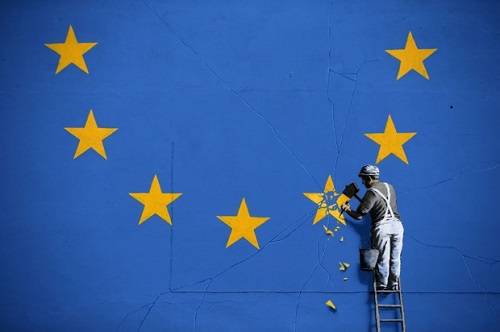AFP photo
By
Hazel Speed
Brexit has been, and continues to be, the overwhelming subject within the UK media, and with considerable interest, of course, in 27 European countries and beyond.
It seems to be a good moment in time to assess what voices are heard in the public domain and the content of remarks being made. It might therefore be helpful to categorise the different areas.
Bearing in mind, firstly, however, that ‘the people’ of the UK won a majority vote to leave the European Union, some of the outline herein is quite surprising as it relates what ‘the people’ are hearing within radio and TV debates or discussions.
Business Interests
Ironically, despite a few accounts of certain businesses having voted for, and looking forward to being free of Europe, the most collective ‘voices’ are coming from disgruntled businesses (and sympathetic politicians, even if their Party does not officially want them to be), and without identifying specific comments, the claims being made by them are as follows:
We need to stay in the customs union (this despite Mrs May’s Lancaster House Speech to the contrary);
We will have to reduce our workload;
We could go out of business;
We cannot go over a cliff edge;
We cannot get British Workers;
People should vote again as they did not vote for a poorer standard of living
…and so it goes on
Question:
Who is speaking for the people (including some businesses), who voted to leave? What did The Prime Minister commit to?
Mrs May has stated, as has Mr Davis, Minister for Exiting Europe (in ongoing negotiations with Mr Barnier of the EU), that there will be no running commentary during negotiations, but regular updates will be given to Parliament and the British people.
Question:
Why, therefore, is everyone predicting, nagging, stirring public concern when nobody else is ‘in the room’ with the negotiators? It is said in certain quarters that the politicians and media alike are embarrassing the UK and jeopardising negotiations (whether deliberately or ineptly), with all the moaning and fear-mongering. Some believe this is all planned in order to overturn democracy.
Division of Age Groups
For the first time in political history, the young are grouping online and supporting their political rock star Jeremy Corbyn. The older generation(s) cannot be heard in such a united force and are being blamed for holding back the young, and spoiling their life chances.
History
The young, who have such angst against the older voters, are selling them short, as although they may be older in age, they were themselves young and remember what Britain was like before joining the European Union in 1972, though then it was called The Common Market, and which has since morphed into quite another entity, regarding which, I dare say, many of the young today will have little, if any, knowledge.
Question:
No disrespect to the youth of today, but many are saying two things about their stance:
In 1972, when the young people may have voted Not to join The Common Market and their vote (and collective voice), was not successful, they just shrugged, accepted that fact, and with true British grit carried on with their lives;
How do the youth of today think Britain managed before The Common Market was even created?
To be frank, many think the youth are being manipulated without realising it.
Whatever the right and wrongs about all sides of the Brexit issue, one thing is certain, as The American saying so aptly puts it, ‘It ain’t over until the fat lady sings’.
In other words, whispers and rumours or leaks (whether deliberate or accidental), may emerge, but it is in the interest of the Government to say nothing and let people spout and comment, then, in due course we will learn the real truth of the matter.
One thing is certain, The Lancaster House Speech was The Prime Minister’s promise.
Somehow, I cannot see her going back on her word on that detail, as whilst the UK needs successful businesses to help the country prosper, the country does not prosper to appease businesses.
If a company owner cannot afford to pay a good living wage in order to employ people legally resident in the UK, then they should not be in business. After all, workers who are unemployed are harshly quite often forced into work beneath their capacity and dignity, so who pleads for them.
The ‘people’ of Britain, collectively, voted to leave Europe and Leave we will. The manner by which this is achieved may surprise us all.
Meanwhile, if only the speculators of what will happen next would only wait and see, it would be so refreshing and democratic for others.
Hazel Speed
Photo (c) Hazel Speed – used by kind permision to Tuck Magazine
Hazel Speed is a Philosopher, Writer, and Artist with various creative projects at differing stages of development. Her flaship project is an animation which has produced a film short: www.thepinkprofessor.com. She has also written an E-novel, ‘Just Suppose…!‘ which is available via the attached link.
Art sites: www.candystoreart.com, www.terrificart.com, www.artbadges.co.uk



No Comments Yet!
You can be first to comment this post!